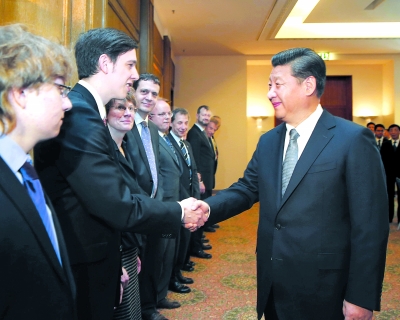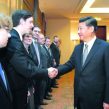
A Spoiled Anniversary: China Reacts to Confucius Institute Controversy
Publication: China Brief Volume: 14 Issue: 19
By:

On September 27, Chinese President Xi Jinping celebrated “Confucius Institute Day,” commemorating the 10-year anniversary of the first Institute’s founding in November 2004, in South Korea. Yet this self-congratulatory atmosphere was clouded by increasing criticism of the Confucius Institute program in the United States, which hosts the largest number of Institutes worldwide. The Chinese media’s reaction has cast this criticism as politically motivated by insecurities stemming from the United States’ decline, as well as a hypocritical double standard of cultural exchange—even linking the issue to conspiracies about U.S. involvement in the ongoing Hong Kong protests.
Celebrating 10 Years of Getting to Know Us Better
The Chinese media extensively covered the 10-year anniversary throughout the month of September, culminating in a People’s Daily front page article featuring President Xi’s congratulatory remarks that “Confucius Institutes belong to China and the world” (People’s Daily, September 28). As Xi proudly recounted, there are now 456 Institutes in 123 countries worldwide, along with 713 Confucius Classrooms (the primary school equivalent), which have taught a combined total of approximately 850,000 students. This includes 16 more Institutes and eight new countries added just this year.
Despite the Institutes’ heritage as part of former president Hu Jintao’s campaign to develop and project Chinese soft power abroad, President Xi has taken up the mantle as a proud sponsor. During his trip to Europe this March, he visited a Confucius Institute in Germany, and Xi attended a signing ceremony to establish an Institute in Brazil during his tour of South America this July (Guangming Daily, March 30; Hanban, July 25). During his visit to the Institute in Germany, Xi reflected upon the Institutes’ raison d’etre: “Some people are biased against China, and this is mainly out of unfamiliarity, estrangement and misunderstanding” (Guangming Daily, March 30). While President Xi has not made a direct link between the Institutes’ soft power agenda and his “China Dream” initiative, Vice Premier Liu Yandong told an anniversary event, “Nowadays, Confucius [Institutes have] become the ‘soul high-speed railway’ connecting peoples of different countries and a colorful tie linking the Chinese Dream and people’s dreams in other countries” (CCTV, September 27).
U.S. Host Institutions Reconsider Cooperation
Several U.S. universities and academic organizations have stepped away from their affiliation with or support of the Institutes since this summer. In June, the American Association of University Professors (AAUP) released a report calling for “universities [to] cease their involvement in Confucius Institutes” (AAUP, June). The AAUP stated that host universities had “sacrificed the integrity of the university and its academic staff,” since the Institutes “advance a state agenda in the recruitment and control of academic staff, in the choice of curriculum, and in the restriction of debate.” On September 25, just two days before its own planned celebration for “Confucius Institute Day,” the University of Chicago said it had decided to “suspend negotiations for the renewal of the agreement for a second term of the Confucius Institute” (University of Chicago, September 25). Lastly, on October 1, Pennsylvania State University (Penn State) announced it would end cooperation with the Institutes at the end of the year, saying, “several of our goals are not consistent with those of the [Institutes]” (Penn State, October 1). These announcements follow years of criticism from university faculties and concerned parents in the United States and the rest of the world.
United States Has Lost Its Confidence
The Chinese media’s reaction was alternatively surprised, incensed and conspiratorial. The main response to the announcements came on October 6, when the Global Times published a diatribe against American cultural imperialism. Wang Dehua—who in September decried the Japanese cartoon character Doraemon—explained that the “closures,” timed during China’s National Day holiday, were a “strong signal of U.S. resistance to Chinese culture, and the background is that the United States is declining and China is rising” (Global Times, September 26; Global Times, October 6). Rejecting perceived U.S. concerns over the “Confucius Institutes [serving] as the Chinese Communist Party’s (CCP) propaganda branch, with the purpose of spreading the CCP’s ideology and thus violating academic freedom,” Wang accused the United States of a double standard by conflating academic freedom with more general freedoms: “In fact, American culture can freely enter other countries, but other nations’ cultures cannot freely enter the United States” (Global Times, October 6).
Wang’s response was likely so bombastic because of the tense atmosphere surrounding the Hong Kong protests and the necessary increase in xenophobic content for the nationalistic Global Times. Wang claimed that the “ban” on Confucius Institutes was because a part of the U.S. intelligentsia “lacks confidence in their culture and their system,” as, when compared to China’s long history, “the United States’ pirate culture is only 200 years old […] and they feel ashamed and scared!” Addressing the protests in Hong Kong, Wang said that the Hong Kong-America Center at the Chinese University of Hong Kong was actually a U.S. consulate-backed training base for the Occupy Central protesters.
U.S. Criticism is Political
While the Chinese media’s response to the universities was sensationalist but limited, its response to the AAUP’s June call for ending all cooperation was much wider and more focused at reassuring a domestic audience. The People’s Daily published first with an article featuring interviews with directors of Institutes in nine countries, all contending that their Institutes never had issues with academic freedom and that the AAUP’s accusations were “wholly wrong,” “preposterous and laughable” and “stemmed from political motives” (People’s Daily, June 20). The article further described the purpose of the Institutes as promoting cultural exchange and understanding, reflecting their mission statement. Later that day, the Global Times addressed the AAUP’s statement by listing several common rebuttals (Global Times, June 20). The article claimed: the Institutes are similar to other Western programs; all cultural promotion is political; the United States is insecure, adopting a double standard and a “Cold War” mentality; and the United States’ concerns are out of ignorance about China. Two days later, Xinhua published a commentary by a former teacher at an Institute in the United States, who described “the truth about U.S. Confucius Institutes” (Xinhua, June 22). The author asserted that academic freedom was not an issue because the author had discussed “Chinese democracy” and “non-Western style democracy” with students at his Institute.
The media’s efforts to couch criticism of the Institutes as politically motivated indeed reflect a larger insecurity within the Chinese political system. A May 2012 directive from the U.S. Department of State that addressed visas issued to Chinese teachers at the Institutes was explained as a backlash driven by U.S. “concerns” about the success of the program and political considerations in the run-up to the 2012 presidential election (Department of State, May 17, 2012; Global Times, May 24, 2012). This June’s Global Times article went to the extreme for every point—the U.S. decision to “refund” the indemnity from the Boxer Rebellion and use the money to found Tsinghua University was “political;” Western education in China was “political and ideological, and even related to the military;” the U.S. fear of the Institutes was “a continuation of McCarthyism;” and, taken together with the U.S. “Rebalancing to Asia” and indictment of five People’s Liberation Army (PLA) officers, was a “political move” (Global Times, June 20).
Learning From “Growing Pains”
Meanwhile, the Chinese media has also attempted to take the criticism in stride. A 2012 People’s Daily article recounted the Institutes’ “unavoidable growing pains” as part of the process of addressing misconceptions and obstacles, since “some Western countries see Confucius Institutes as political vassals” (People’s Daily, December 19, 2012). While the Chinese media has yet to address the core difference between other countries’ programs and the Institutes—namely that only China places the Institutes directly within schools—the article did concede that “entering the education system is seen as the Confucius Institutes’ opening to ‘enter’ [the host country].”
At the same time, this indicates that the Chinese government is aware of the root cause of the criticism—the program’s close government ties—but is unwilling to allow the Institutes to become independent and grow on their own. It appears that for all of the importance Xi Jinping’s “China Dream” places on China having confidence in itself, the leadership is far from ready to let the country’s soft power flow from the people, not the Party.





